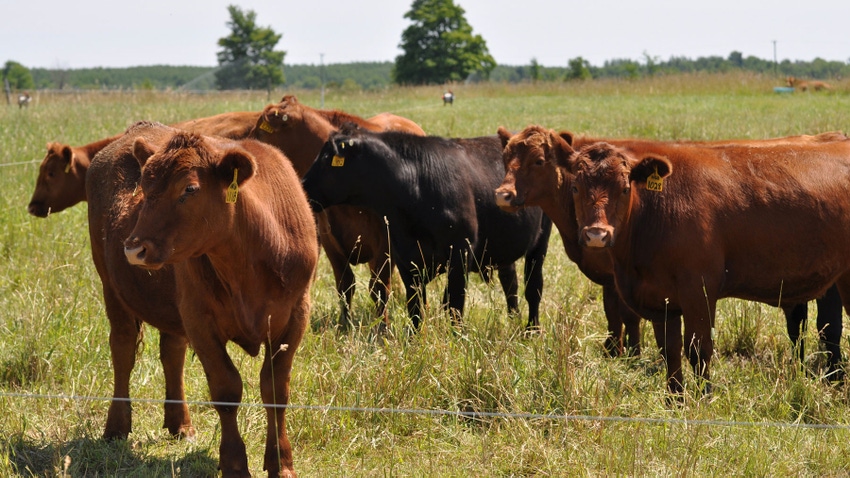
Michigan beef producers need to reach consumers with their stories of nutritious beef — humanely and sustainably produced — now more than ever, says George Quackenbush Michigan Beef Industry Commission executive director.
“The public is skeptical, and pressure from outside groups is at an all-time high,” says Quackenbush, who has been with the organization for 18 years. “Our industry struggles to step out from behind the farm gate and communicate with the public about how cattle are raised. Consumers are disconnected from where their food is produced, which allows outside groups to leverage modern communications with sustained misinformation very successfully. MBIC’s work helps more people recognize beef’s value and the work producers do to raise beef safely and responsibly. It takes resources and expertise to do that well.”
The current $1-per-head national checkoff program, of which Michigan retains half, is not enough — more resources are necessary, the organization says.
Since its inception, the $1-per-head national beef checkoff now has the buying power of just 36 cents, Quackenbush relates. “We’ve all seen the impact of inflation on the cost of products and services just in the past few years,” he says. “MBIC is working with the same assessment revenue today that it had nearly 40 years ago.”
Rather than raising the national checkoff, a proposal calls for a Michigan beef checkoff of 10 cents for every $100 of value when cattle are sold and capped at $1 per head. One hundred percent of the state checkoff would stay in Michigan where the MBIC, composed of Michigan producers, would be able to invest those resources to address priorities for Michigan’s beef industry.
“The producer community has been talking about this for years, and there is strong support for this being an overdue modernization of our resources,” Quackenbush says.
Since the assessment was prescribed in the law that established MBIC and was later approved by a producer referendum, before the 1985 national checkoff, an additional referendum is not necessary, Quackenbush explains.
The decision will be made during the July 20 meeting of MBIC, at 9 a.m. at 12800 Escanaba Drive in DeWitt. All meetings of the commission are open to the public.
The commission is working with the Michigan Department of Agriculture and Rural Development to host online listening sessions. The sessions are scheduled for 10 a.m. June 29 and 1 p.m. and 7 p.m. July 13. An announcement with the meeting links will be posted at mibeef.org.
If established, it would follow 18 other states that have developed their own beef checkoff programs in addition to the federal beef checkoff.
In fiscal 2022, total national checkoff assessments from Michigan producers were $555,841. In accordance with the federal law, half was forwarded to the Cattlemen’s Beef Promotion and Research Board to support programs at the national level, leaving MBIC with net revenues of $279,363.
Total national assessment revenues from all U.S. states in fiscal 2022 was $35,749,968.
“This is a turning point for our industry in Michigan,” Quackenbush says. “Our ability to do the job beef producers expect requires adequate resources, and this proposal will allow us to deliver effectively on their behalf.”
The law that established MBIC provides flexibility for the commission to address issues that are important to cattle producers, in addition to the critical work of building demand for beef.
“If there were an animal health, environmental or regulatory concern Michigan beef producers were facing, with the state checkoff, the commission could choose to allocate some resources to help research or address the issue,” Quackenbush explains. “We don’t have this flexibility with the national checkoff.”
Expanding outreach
Reaching a diverse mix of consumers requires ingenuity to increase beef’s visibility. Virtual farm tours and engagement with other forms of traditional and digital media are a few examples of outreach. MBIC also is exploring an opportunity to partner with other state beef councils on a comprehensive sports nutrition program called Build Your Base, to promote the role of beef in athletic performance and exercise recovery, Quackenbush says.
“It is critical that we expand our educational programs,” MBIC Chairman Monte Bordner says. “Our work to inform pediatricians, cardiologists and others in the health community about the benefits of nutrient-dense beef in a healthy diet has been exceptionally well received.
“We are now poised to launch an initiative focusing on fitness, promoting beef’s role in strength building and athletic performance. This is about growing consumer trust in our product, increasing beef’s visibility, and creating opportunities for future generations in our industry.”
The checkoff would allow expansion of its current efforts. Some highlights from this past year include:
Pediatric outreach. MBIC shared the latest research supporting beef’s role in the diets of young children with members of the Michigan Academy of Nutrition and Dietetics, Academy of Pediatrics, and Academy of Family Physicians. Giving health professionals accurate information and materials makes them more confident in recommending beef to their patients and clients.
Social media. Through partnerships with social influencers, MBIC reaches thousands of consumers every year with messages that reminds them of beef’s great taste, versatility and nutritional value — ultimately inspiring them to make a beef purchase and prepare beef for their families.
Reaching consumers. For the past two years, MBIC has partnered with Michigan International Speedway to put beef front and center in the minds of racing fans during Michigan’s biggest racing weekend. MBIC held beef-sampling demonstrations, gave away thousands of “Beef. It’s What’s for Dinner” can koozies, and engaged fans in an online contest where the Irish Hills Ruben Burger was named the official burger of MIS.
Learn more about the Michigan beef industry at mibeef.org.
Read more about:
BeefAbout the Author(s)
You May Also Like






